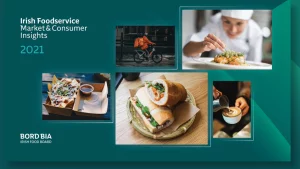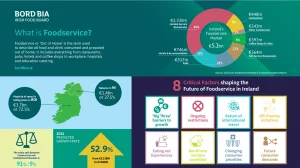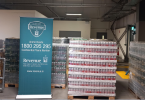Eating out most missed social activity during Covid-19

Pubs were responsible for 12% of total Commercial Foodservice spend in 2020 and this is expected to rise to 13% in 2021 according to Bord Bia’s latest Foodservice Insights report.
Of those surveyed, the social aspect of dining out is what they most look forward to.
This makes eating out the most missed social activity compared to shopping for leisure (59%), concerts, sports & live events (57%) and spending time with colleagues (45%).
The value of the Irish Foodservice sector increased in 2021, but it remains 41% lower than pre-pandemic according to Bord Bia.
According to the Report, the value of the Island of Ireland foodservice (or out of home) industry for 2021 will reach €5.15 billion.
This represents moderate year-on-year growth of 14.6% but remains 41% off pre-pandemic turnover levels.
Pubs form 10% of the Island of Ireland’s €5.15 billion Total Foodservice market, of which RoI is responsible for €3.7 billion.
Pubs were responsible for 12% of total Commercial Foodservice spend in 2020 and this is expected to rise to 13% in 2021.
However fast food, pubs and bars are growing for younger customers in particular, according to the report which states, “It seems that the return to foodservice overall is being driven very much by the younger cohorts”.
Cautious consumer
The report also reveals that there remains a degree of caution around eating out, especially among older demographics and that full recovery in the sector is not expected until 2023 at the earliest. Despite a widespread view that there are adequate Covid-19 safety measures in place, for six in 10 diners (61%), there’s some degree of nervousness about eating out.
Consumer Attitudes
The majority of consumers (71%) said that they preferred dining out rather than eating a takeaway at home yet at the same time growth in takeaways driven by Covid-19 restrictions is likely to continue, particularly amongst those with younger families according to Bord Bia.
With a proliferation of new takeaway and delivery options and further exposure to ordering and delivery apps, takeaways are here to stay – 41% of adults say they’re likely to consume more takeaways in the future compared to pre-Covid.
Sustainability remains important with almost half (45%) saying that in a post-pandemic world they’ll be more likely to choose options that are kinder to the environment, with packaging a key influence on this.
Meanwhile, the ‘Support for local’ movement appears to have been bolstered by the pandemic: half of all adults – especially those in the older demographic (57% over the age of 50) – are now more likely to choose a Foodservice option that supports local business and the community, found Bord Bia.
Critical Factors Facing Foodservice
Over the last 18 months, the industry has adapted to changing demands. The report calls out eight Critical Factors facing the industry which are set to continue into the future:
- ‘Big Three’ barriers to growth – supply chain challenges, labour and higher prices/inflation all have the potential to hamper stronger growth in 2022. Across all groups there’s a recognition by eight in 10 people that it has become more expensive to eat out now.
- Ongoing restrictions – underlying consumer demand remains strong but full return to normality won’t occur until the public health situation allows.
- Return of international travel – while domestic demand helped sustain many segments of the tourism industry, it will struggle to reach full recovery until public health advice allows the return to full international travel.
- Off-premise initiatives – even as the industry is allowed to re-open for dine-in, click and collect, takeaway drive-throughs are critical to operator success.
- Experience is increasingly important – consumers crave the experience of eating out and will increasingly be looking for something new, unique or different to drive their decisions in the future.
- Workforce remains unsettled – consumers have yet to return to any type of ‘routine’ and a return to the office and resumption of pre-pandemic activities remain unlikely in the short term.
- Changing consumer priorities – outside of Covid-19 protections, other priorities have an important bearing on choice of Foodservice outlet. Healthier food choices, sustainability and ‘support for local’ will all play a greater role.
- Future consumer demands – The future of Foodservice will not simply be a return to ‘business as usual’. Operators will need to embrace a changing consumer that has more choice in the range of options they can access and the means by which to access them
“The Irish foodservice sector has shown itself to be incredibly resilient in the face of immense pressure and has successfully adapted to meet many of the challenges it has faced in the last 18 months,” commented Bord Bia’s Chief Executive Tara McCarthy, “There’s no doubt that suppliers can play an important role in helping operators to navigate ongoing challenges facing the sector and we would encourage them to work collaboratively in helping to identify future solutions. This could include creating labour-saving products, providing transparency around environmental, sustainability and provenance messages, enhancing communications around supply chain issues and developing new products that meet the needs of hybrid workers or delivery customers. It’s reassuring to see that for consumers, sustainability and supporting local remain important considerations in choosing Foodservice options, trends that are also being reflected in some of our recent global consumer insight studies.”
Certain segments of the market such as Limited Service Restaurants and coffee shops have been less impacted and will recover quicker in 2022,” believes Maureen Gahan, Bord Bia’s Foodservice Specialist, “However others, such as restaurants, hotels, pubs and workplace catering will continue to be impacted not only by Covid-19 public health restrictions but also by other broader sector challenges.
“These barriers to growth include labour shortages, supply chain disruption and rapidly rising inflation – all of which are complex issues being faced at a global level, which will require global solutions.”
Foodservice Seminar
The findings of the report were shared with more than 500 delegates at Bord Bia’s virtual Foodservice Seminar from the RDS, Dublin, recently. The annual event, which discusses emerging trends in the sector, was chaired by broadcaster & entrepreneur Aine Kerr and featured contributions from Declan Foley of Krispy Kreme, Sandra Kirwan of Glanbia Ireland, Deirdre O’Neill of Compass Group Ireland, John O’Toole of Airfield Estate, Lucy Dee of Taco Bell, Jeananne O’Brien of Eatto and Glenn Edwards of Leon.
Full analysis of Foodservice report in next issue of Drinks Industry Ireland.










